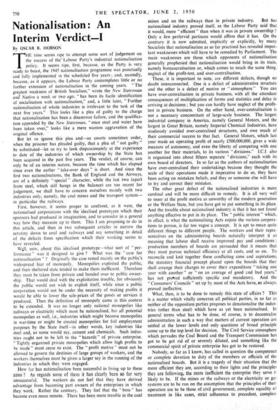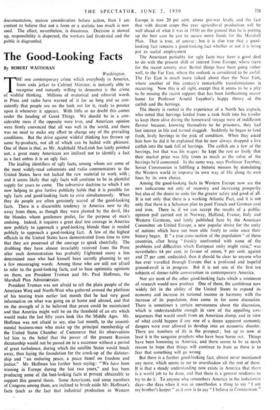Nationalisation: An Interim Verdict —I
By OSCAR R. HOBSON
THE time seems ripe to attempt some sort of judgement on the success of the Labour Party's industrial nationalisation policy. It seems ripe, first, because, as the Party is very ready to boast, the 1945 nationalisation programme was punctually and fully implemented in the scheduled five years ; and, secondly,
because, as it appears, the Labour Party contemplates little or no
further extension of nationalisation in the coming years. " The greatest weakness of British Socialism," wrote the New Statesman anti Nation a week or two ago, " has been its facile identification
of socialisation with nationalisation," and, a little later, " Further nationalisation of whole industries is irrelevant to the task of the
next five years." This looks like a plea of guilty to the charge that nationalisation has been a disastrous failure, and the qualifica- tion appended by the New Statesman, " once steel and water have been taken over," looks like a mere wanton aggravation of the original offence.
But let us ignore this plea and—as courts sometimes order, when the prisoner has pleaded guilty, that a plea of " not guilty " be substituted—let us try to look dispassionately at the experience
to date of the industries of which ownership by the State has been acquired in the past five years. The verdict, of course, can
only be of an interim nature, because the time which has elapsed since even the earlier " take-over days " is short. And since the first two nationalisations, the Bank of England and the Airways, are of a definitely " special " character, while the last two (apart from steel, which still hangs in the balance) are too recent for judgement, we shall have to concern ourselves mainly with two industries only, namely, the coal mines and the transport system— in particular the railways.
First, however, it seems proper to confront, as it were, the nationalised corporations with the idealised prototypes which their sponsors had produced in imagination, and to consider in a general way how they measure up to them. This I am proposing to do in this article, and then in two subsequent articles to narrow the scrutiny down to coal and railways and say something in detail of the defects from specification which their working seems tc have revealed.
Well, now, about this idealised prototype—what sort of " per- formance " was it designed to give ? What was the " case for nationalisation " ? Originally the case rested mainly on the public's widespread fear of monopoly. Monopolies exploited the public, and their. sheltered state tended to make them inefficient. Therefore
they must be taken from private and handed over to public owner- ship. That would deal with the exploitation trouble, for obviously the public would not wish to exploit itself, while since a public corporation would not be under the necessity of making profits it would be able to lower the sale-prices of the goods or services it produced. Then the definition of monopoly came in this context to be extended. It was no longer only national monopolies like railways or electricity which must be nationalised, but all potential monopolies as well, i.e., industries which might become monopolies in war-time or might be created monopolies for full employment purposes by the State itself—in other words, key industries like steel and, as some would say, cement and chemicals. Such indus- tries ought not to be left to the " hazards " of private enterprise. " Tightly organised private monopolies which allow high profits to be made " must cease to exist. The " profit motive " must not be allowed to govern the destinies of large groups of workers, and the workers themselves must be given a larger say in the running of the industries in which they were engaged.
How far has nationalisation been successful in living up to these aims ? As regards some of them it has clearly been so far very unsuccessful. The workers do not feel that they have derived advantage from becoming part owners of the enterprises in which they work. Rather the contrary. They feel that the " boss " has become even more remote. There has been more trouble in the coal
mines and on the railways than in private industry. But has nationalised industry proved itself, as the Labour Party said that it would, more " efficient " than when it was in private ownership ? Only a few perfervid partisans would affirm that it has. On the contrary it is now admitted, implicitly or explicitly, by many Socialists that nationalisation as so far practised has revealed impor- tant weaknesses which will have to be remedied by Parliament. The main weaknesses are those which opponents of nationalisation generally prophesied that nationalisation would bring in its train, namely bureaucratisation or, which comes to much the same thing, neglect of the profit-test, and over-centralisation.
These, it is important to note, are different defects, though no doubt interconnected. One is a defect of administrative structure and the other is a defect of motive or " atmosphere." You can have over-centralisation in private business, with all the attendant consequences of multiplication of forms and statistics and delay in arriving at decisions ; but you can hardly have neglect of the profit- test in private business. On the other hand, over-centralisation is not a necessary concomitant of large-scale business. The largest industrial company in America, namely General Motors, and the largest in Great Britain, namely Imperial Chemical Industries, have studiously avoided over-centralised structures, and owe much of their commercial success to that fact. General Motors, which last year made an operating profit of nearly £500,000,000, gives a wide measure of autonomy, and even the liberty of competing with one another for their materials, to its various " divisions." I.C.I.also is organised into about fifteen separate " divisions," each with its own board of directors. In so far as the authors of nationalisation have over-centralised their undertakings because they thought the scale of their operations made it imperative to do so, they have been acting on mistaken beliefs, and they or someone else will have to try and correct their mistakes.
The other great defect of the nationalised industries is more cardinal and will be more difficult to remedy. It is all very well to sneer at the profit motive as unworthy of the modern generation or the Welfare State, but you have got to put something in its place. And the trouble about nationalised industry is that it has not found anything effective to put in its place. The " public interest " which, in effect, is what the nationalising Acts enjoin the various corpora- tions to pursue, is far too vague a concept. It is apt to mean quite different things to different people. The workers and their repre- sentatives on the administering boards naturally interpret it as meaning that labour shall receive improved pay and conditions ; production members of boards are persuaded that it means that they must pursue technical efficiency at all costs, and so on. To reconcile and knit together these conflicting aims and aspirations, the statutory financial precept .placed upon the boards that they shall arrange their charges to cover their expenditure " taking one year with another " or " on an average of good and bad years," has not proved sufficiently specific and mandatory. And the " Consumers' Councils " set up by most of the Acts have, as always, proved ineffective.
What, then, is to be done to remedy this state of affairs ? This is a matter which vitally concerns all political parties, in so far as neither of the opposition parties proposes to denationalise the indus- tries (other than steel) which have as yet been nationalised. In general terms what has to be done, of course, is to decentralise administration in such a way that matters of current operation are settled at the lower levels and only questions of broad principle come up to the top level for decision. The Civil Service atmosphere
which pervades the Coal Board and the Transport Commission has got to be got rid of or severely diluted, and something like the commercial spirit of private enterprise has got to be restored.
Nobody, so far as I know, has called in question the competence or complete devotion to duty of the members or officials of the nationalised boards. But it is a tragedy of their situation that the
more efficient they are, according to their. lights and the principles they are following, the more inefficient the enterprise they serve is
likely to be. If the mines or the railways or the electricity or gas systems are to be run on the assumption that the principles of their operation are to be those of civil government, complete equality of treatment in like cases, strict adherence to precedent, complete documentation, mature consideration before action, then I am content to believe that not a form or a statistic too much is now used. The effect, nevertheless, is disastrous. Decision is slowed up, responsibility is dispersed, the workers feet frustrated and the public is disgruntled.



































 Previous page
Previous page